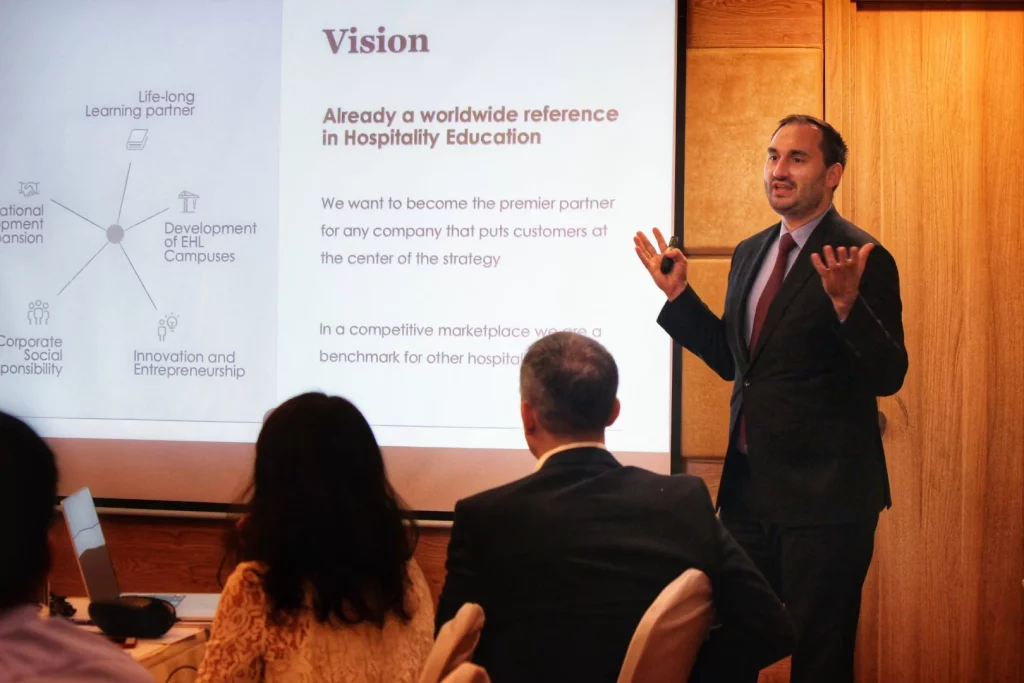- Tourism workforce challenge: Vietnam’s tourism needs more personnel meeting global standards, undermining competitiveness in pursuing the goal of 50 million international visitors and 17% GDP contribution by 2030.
- Swiss solution: Partnering with EHL—the world’s top hospitality school—bringing professional, international-standard, and sustainable training to Vietnam.
- ST4SD project initiative: A flexible program with 80% online learning and 20% hands-on practice, offering skill enhancement opportunities for personnel nationwide.
- Sustainable future: Building a core workforce to elevate Vietnam’s tourism on the global stage.
National Tourism Strategy Context
After years of challenges posed by the pandemic, Vietnam’s tourism industry stands at a pivotal moment to assert its position regionally and globally. Achieving this requires a highly skilled workforce capable of meeting international standards and promoting sustainable values. Approved by the Prime Minister, Vietnam’s Tourism Development Strategy to 2030 identifies human resource development as a key pillar to realize strategic goals, from enhancing service quality to fostering destinations that are responsible towards communities and the environment. The tourism sector faces significant pressure to meet long-term strategic objectives, including increasing international visitor numbers and contributing substantially to national economic growth.
Only a part of the current tourism workforce possesses skills that meet international standards, while the industry requires an additional 50,000 professionally trained personnel annually to sustain growth. These limitations not only hinder competitiveness against countries like Thailand and Malaysia but also slow Vietnam’s integration into global tourism trends, such as personalized services and sustainable operations. However, the current domestic training system still lags significantly behind high-quality international professional programs. Local training initiatives need to learn from global models to develop the service mindset and practical skills essential for a tourism industry competitive in Southeast Asia and beyond.
From a state management perspective, establishing a human resource training system integrated into national tourism policy is an urgent priority to ensure destinations from Hà Giang to Đồng Tháp can deliver high-quality services while preserving cultural and environmental values.

The Swiss Program: A Catalyst for Human Resource Policy
Aligning with national strategy, the Swiss Hospitality Management Training Program is an initiative under the Swiss Tourism for Sustainable Development in Vietnam (ST4SD) project, funded by the Swiss State Secretariat for Economic Affairs (SECO) and led by VNAT, with implementation by HELVETAS Vietnam and CRED. This program can be seen as a significant contribution from the Swiss Government to Vietnam’s tourism sector. Tourism has been a cornerstone of Switzerland’s service economy for centuries. With knowledge and experience accumulated over generations, Swiss training institutions consistently lead in producing top-tier hospitality and tourism professionals. In 2025 alone, three of the world’s leading hospitality training institutions are based in Switzerland.
To bridge the gap in tourism workforce training, the ST4SD project has partnered with the world-renowned EHL Hospitality Business School (founded in 1893 in Lausanne, Switzerland, the first global hospitality management school) to design and deliver a flexible training program. The initiative aims to standardize human resources and shape a modern, sustainable, and regionally competitive Vietnamese tourism industry.
The Swiss Hospitality Management Training Program is crafted to address these challenges. From a state management perspective, it is not merely a course but a strategic tool to standardize the workforce, enabling the tourism industry to meet international benchmarks and support sustainable development goals. Currently in its pilot phase with leading domestic institutions such as the National Economics University (public university), IBH Hospitality Training Academy (private vocational school), Văn Lang University (private university), and Saigon Tourism College (public vocational school), the program targets a diverse group—from students and recent graduates to mid- and senior-level managers in tourism agencies and accommodations. These individuals will become the vanguard in elevating Vietnam’s tourism sector. By blending theory and practice, the program ensures participants not only master skills but also adopt the mindset needed to contribute to national strategy.

What Does the ST4SD and EHL Program Offer?
The program is structured into three levels—Foundations, Intermediate, and Advanced—each lasting one month and tailored to different industry roles. The Foundations level targets new employees, students, and staff at tourism destinations, providing essentials in communication, hygiene, sustainable operations, and customer service. The Intermediate level is designed for mid-level managers and small business owners, emphasizing sustainable F&B and room operations, hotel etiquette, and cultural awareness. The Advanced level focuses on future leaders, diving deep into customer service excellence, human resource training, sustainable leadership, and management communication. Each level combines 80% online learning via EHL’s Learning Management System (LMS) and 20% in-person training at local institutions, ensuring flexibility and practicality.
A standout feature is the integration of sustainability into every aspect of the program. From resource management in F&B and housekeeping to fostering a leadership culture accountable to the environment and society, the program equips learners with a systemic mindset to balance economic, environmental, and community benefits. Vietnamese instructors, trained through EHL’s Đào tạo Huấn luyện Thực nghiệm Ứng dụng và Chuyển giao (Train the Trainer) methodology, use real-world case studies and practical examples to bridge theory and practice, preparing participants for the global tourism industry’s challenges.
Participants completing each level can receive an EHL certificate. Additionally, the program establishes an alumni network, fostering connections, knowledge sharing, and sustainable development within Vietnam’s tourism sector. With rigorous recruitment, continuous evaluation, and annual quality checks, the program ensures a high-caliber learning experience, contributing to elevating Vietnam’s tourism stature globally.
Envisioning a Sustainable Future for Vietnamese Tourism
The Swiss Hospitality Management Training Program marks a significant step for VNAT in implementing Vietnam’s Tourism Development Strategy to 2030. According to the World Travel & Tourism Council (WTTC) 2024 forecast, a high-quality workforce could enable Vietnamese tourism to capture 14% of the ASEAN tourism market by 2030, and this program is a vital component in achieving that goal. By equipping tourism personnel at all levels—both in state management and private enterprises—with practical skills and global knowledge, the program not only enhances workforce capabilities but also lays the foundation for sustainable destination development across Vietnam. It is a starting point for Vietnamese professionals to become trailblazers, ready to meet global trends from personalized services to responsible tourism. Guided by VNAT and SECO, alongside HELVETAS Vietnam and CRED, the program is paving the way for a modern, sustainable, and competitive Vietnamese tourism industry, bringing local destinations onto the global tourism map.